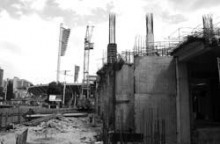As the 2012 European Soccer Championships keep getting closer, problems continue to pile up in Ukraine. On the initiative of the European Business Association, our government officials, diplomats, and businesspeople decided to sort them out by holding so-called Eurodebates aimed at determining the role of business in the preparations for this outstanding event.
“Today it is extremely important to establish an open, understandable, and constructive dialogue between the government and business community so that we can adequately prepare for and hold this major international event, the 2012 European soccer finals, in Ukraine,” said Family, Youth, and Sports Minister Viktor Korzh, who added that plans to host the International Investment Forum Euro 2012 are also underway.
Meanwhile, it is all too clear that an event of this caliber can be effectively carried out only if we can actually rebuild our country in the years left before the date rolls around. The people in charge must focus attention not only on sports facilities but on hotels, highways, railroads, and airports. Can all this be accomplished in five years?
Acting director of the European Business Association Hanna Derevianko is confident that Ukraine can cope with this task. “The choice of Ukraine as the host of the 2012 European Soccer Championships means that our country has a great opportunity to mobilize all its resources, coordinate the efforts of central and local authorities, enlist the greatest possible amount of investments, and launch an open dialogue with the international community, and Ukraine can thereby present itself as a worthy candidate member of the European Union.”
Derevianko’s view is echoed by many other participants in the Eurodebates. Siemens Ukraine director-general Andrea Raffaseder pointed to Euro 2012’s great investment potential for Ukraine: “The decision to hold the European championships [in Ukraine] may result in a foreign as well as domestic investment breakthrough. There are great opportunities, but they must be used the right way... Then this important opportunity will have a tremendous positive effect on the influx of investment capital, with investors becoming more confident in Ukraine.”
Government officials who attended the debates agreed that Euro 2012 would be a success in Ukraine and Poland, but offered varying assessments of the preparations for the championships. The sports minister said that the Ukrainian government is doing “serious work.” The Euro 2012 Organizing Committee has been set up, and there is an official concept of preparations for the event. Minister of Transport and Communications Mykola Rudkovsky listed the tasks that have been assigned to his ministry, intriguing journalists and guests from Poland, Austria, Greece, and other countries: “Our task is to build new roads, airports, and so on.” Rudkovsky said that air routes between the cities hosting the championships are the biggest headache. New aircraft will be purchased and new airports built. Some 800 million dollars have been allocated for the latter projects, excluding Boryspil Airport. Ukraine’s main air terminal will be financed under a special program drafted by a Japanese bank. A special express railroad is planned to connect Boryspil with Kyiv, another 200 million dollars’ worth of appropriations, Ukraine’s transport minister said.
The government’s plans are enough to make your head spin. They include a highway circling Kyiv (cost: approximately $5.5 billion), and the Lviv-Luhansk highway that will cost $7.5 billion. The national railroad company, Ukrzaliznytsia, requires about $3 billion for the reconstruction and refurbishment of its rolling stock. According to Rudkovsky, 18 percent of this money will come from the central budget, 60-70 percent will come from loans guaranteed by the government, while the rest will be generated by investments. According to estimates drawn up by the Ministry of Economy, foreign investments in Ukraine will reach $25-30 billion because of Euro 2012.
Minister of Regional Development and Construction Volodymyr Yatsuba underlined that from now on the government must concentrate only on projects that businesspeople cannot take on: “Without enough attractive projects businesspeople will start looking elsewhere...those who love soccer more than their money should be supported” (e.g., businessmen in Donetsk and Dnipropetrovsk). Yatsuba noted that these cities are ready to host Euro 2012 in terms of soccer. “Ukraine has accepted the challenge and everything will be fine. We’ll have Euro 2012 and money.” His optimism is explained by construction growth of 147 percent in Ukraine, compared to some 20 percent in Poland, according to Ambassador Jacek Kluczkowski.
The fact that Ukraine has a partner in the Euro 2012 project seemed to fade away from the effect of all those impassioned speeches and declarations. Poland also has a great deal of work to do. “We’ve counted our money and so far it’s not enough,” Poland’s ambassador said. As for border crossings during the soccer meets, Kluczkowski emphasized that this issue should not be overstated. There will be a separate border-crossing route established, and there will not be any problems.
Minister of Culture and Tourism Yurii Bohutsky pointed out that soccer would occupy only one-tenth of the tourists’ time, so arrangements should be made to keep them entertained. “I would like to have all of us thinking along realistic lines rather than offer flag-waving statements...The government must provide conditions to attract investors in the first place, so that each of them can see Euro 2012 as just one of the reasons for investing money here; so that each person investing in the construction of a hotel for Euro 2012 will be certain that this project will keep producing revenues after the championships...In other words, we must give our investors guarantees that their money will bring them more money.”







